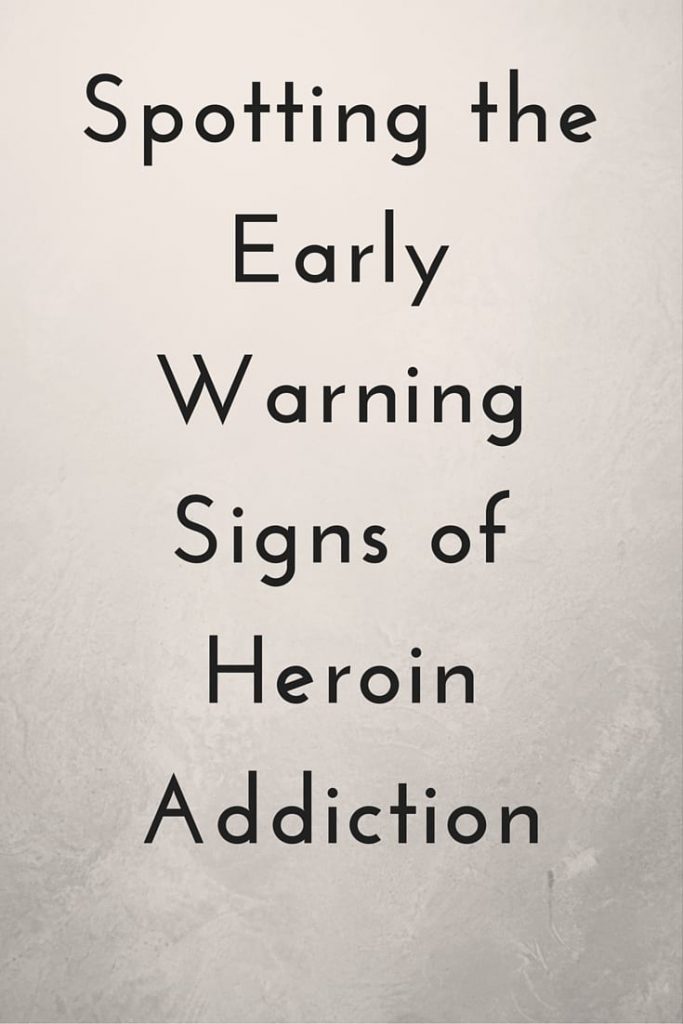In honor of Alcoholism and Drug Dependence Awareness Month, today’s guest blog post comes to us from Matt Abbasfard from Northbound in Newport Beach, CA. He discusses the warning signs of heroin and opioid addiction and the importance of seeking help for a loved one who might be struggling with a substance use disorder. Heroin use is on the rise in the United States so it is crucial that we all learn more about its effects. A big thanks to Matt for sharing this information with us at rtor.org. –Veronique Hoebeke, Associate Editor
Spotting the Early Warning Signs of Heroin Addiction
It is often difficult to recognize the signs of heroin addiction. Although you may have heard about heroin addiction in the media or seen it portrayed on television, many have never known someone who was addicted to heroin. Some of the symptoms displayed when the addict is early in their addiction are easily confused with other issues. The lack of experience with substance abuse makes it difficult for many people to recognize the signs of a heroin addiction for what they are. Understanding and recognizing the signs of heroin addiction will help you to find the best possible treatment for your child or loved one.
Having a child or loved one who suffers from a mental health disorder can be very stressful, and discovering the signs of heroin addiction in conjunction with that disorder is a frightening experience. Mental health disorders and addiction often go hand-in-hand. The combination of a mental health disorder and a substance abuse problem is known as a co-occurring disorder, and is often times referred to as a dual diagnosis.
Although many parents would be shocked to learn that their son or daughter is using heroin, the last decade has given rise to the highest levels of heroin addiction that the United States has ever seen. What was once an issue associated primarily with minorities in lower socioeconomic neighborhoods has become an epidemic. The Center for Disease Control reports that heroin addiction primarily affects white males between the ages of 18 and 44. Overdoses have increased over 280% since 2002, and the number of heroin addicts in the United States has doubled to over 200,000.
If you are concerned that your loved one may be abusing substances, then it is important to understand the signs of heroin addiction. This article will explain the most common physical, psychological, and behavioral signs of heroin addiction, as well as what you can do to get your loved one professional help.
Admitting There’s A Problem
Admitting your loved one might have a substance abuse problem is the first step. This admission can be very difficult as the love you have for this person may prevent you from seeing all the signs. It’s often tempting to look the other way or make excuses but facing this frightening reality and admitting that there be a problem is crucial for you to get your loved one the help that they so desperately needed.
Signs of Heroin Addiction
Although everyone using heroin will have their own unique habits and behaviors, it is helpful to understand some of the telltale signs of heroin addiction. These symptoms may be exaggerated or less prominent in some addicts, but they exist in everyone who is abusing heroin or other opioids.
Behavioral signs of heroin addiction:
• Loss of interest in school and/or ditching class
• Loss of interest in hobbies, activities, and sports.
• Isolating and withdrawing from friends and family members.
• Getting into arguments or becoming increasingly irritated with friends, loved ones, neighbors, classmates, and instructors.
• Stealing or borrowing money, often times making up unlikely reasons for why they need that money.
• Losing valuables.
• Abruptly stopping their medication.
Physical signs of heroin addiction:
• Dilated pupils.
• Appearing exhausted and falling asleep without warning.
• Drastic changes in appetite, including over-eating or not eating.
• Drastic change in sleep patterns.
• Loss of attention to hygiene and grooming.
• Sluggish movements and slurred speech.
Psychological signs of heroin addiction:
• Drastic, unpredictable mood swings.
• Erratic, extreme behavior.
• Extreme irritability or anger.
• Unexplainable paranoia, anxiety, or fear.
It is important to understand that many of these signs of heroin addiction may be the result of other issues. Many young people have periods where they are uninterested in school and friends, and this may not have anything to do with substance abuse. Many parents could describe their teenagers as having “drastic, unpredictable mood swings,” at times, and this is usually just the result of puberty and adolescence.
Additionally, these behaviors may be the result of a mental health disorder, or could occur because your loved one has stopped taking their medication. That being said, nobody understands your loved one better than you do. If these behaviors are especially surprising and erratic, and cannot be explained by any other means, then there is a good chance that they are signs of heroin addiction.It’s vital to know that these physical, psychological, and behavioral signs of heroin addiction are often accompanied by paraphernalia used in heroin abuse.
Paraphernalia Used in Heroin Addiction
Finding paraphernalia related to heroin abuse is the most obvious sign of heroin addiction. These items will vary depending on whether your loved one is smoking, snorting, or injecting heroin.
Smoking:
• Straws, tubes, or rolled up pieces of paper used to inhale heroin smoke.
• Tin foil with burned, blackened streaks.
• Clear glass pipes.
Snorting:
• Hollowed out pens or any hollow cylinder used to snort heroin.
• Empty plastic bags with white, tan, or brown powder.
Injecting:
• Needles or syringes.
• Discarded rubber tubing, strings, shoelaces, or belts used to tie off the injection site.
• Bruising or markings on the arms.
• Wearing long sleeves to cover up bruising or markings.
Finding any of this paraphernalia is the most telling of the signs of heroin addiction. If you have recognized any of these behaviors and/or discovered any of this paraphernalia, then it’s strongly suggest seeking professional treatment for your child or loved one.
Treatment of Co-Occurring Disorders
To ensure the highest chance of recovery for your loved one with both a substance abuse disorder and a mental health disorder, seek professional treatment for them. There are thousands of alcohol and drug treatment programs to choose from, so here are a few suggestions in order to help you narrow down your choices.
First of all, it’s strongly encouraged to select a program that specializes in the treatment of co-occurring disorders. Although many treatment programs offer therapy and medication, some of them are far more adept at offering comprehensive treatment of mental health disorders. Treating both disorders effectively and simultaneously will offer your loved one the best chance of success.
Next, be sure to select a program that specializes in treating the signs of heroin addiction. There are many programs that specialize in the treatment of heroin and opioid addiction. The most effective of these utilize a form of treatment known as medication assisted treatment (MAT). This combines newer medications that reduce cravings and eliminate withdrawal with evidence-based forms of therapy proven effective in substance abuse treatment. These medications are safe to be taken over the long term, and will give your loved one an added layer of protection.
Finally, understand the difficulty in recovering from heroin addiction. Many addicts are able to get clean on their first attempt, while others may struggle to get clean for years. Relapse is not necessarily a step in the wrong direction, although it may appear that way. Recovery occurs through a combination of effective treatment and a strong desire to change one’s life. This desire is often the result of “hitting bottom,” and sometimes our loved one just hasn’t gotten there yet. A relapse may be the thing they need to motivate them to recover, and can force the addict to take a hard look at their choices and modify their behavior.
Although each addict who gets clean has their own unique set of circumstances, the most effective combination includes: effective treatment from a program that specializes in heroin addiction and co-occuring disorders, the strong desire to get clean, family support and viable aftercare. Beating a heroin or opioid addition is very difficult but recovery is definitely possible.
Sources:
http://www.usnews.com/news/blogs/data-mine/2015/08/19/the-heroin-epidemic-in-9-graphs
http://www.cdc.gov/vitalsigns/heroin/
https://www.psychologytoday.com/conditions/co-occurring-disorders
Matt Abbasfard
Online Marketing






